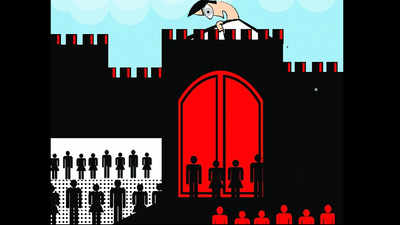- News
- City News
- guwahati News
- No citizenship for refugees, Arunachal says in one voice
Trending
This story is from September 22, 2017
No citizenship for refugees, Arunachal says in one voice

GUWAHATI: Cutting across party lines, Arunachal Pradesh is resisting any attempt to confer citizenship on Chakma and Hajong refugees who fled to the state from erstwhile East Pakistan in the early 1960s. Most in the frontier state are of the view that granting of citizenship rights to the asylum-seekers goes against the very Constitution that protects them against migrations and their influence.
Under various constitutional provisions, the predominantly tribal state enjoys special protection against the settlement or influx of outsiders and alien culture.Outsiders, including Indian citizens, are neither allowed to possess land in the state nor are permitted to visit it without Inner Line Permits (ILPs). This system of entry into Arunachal, earlier known as North-East Frontier Agency, is derived from the Bengal Eastern Frontier Regulations, 1873.
The office of the state's BJP chief minister Pema Khandu was unequivocal about its stand on the issue.It said, “The chief minister is clear about his strong commitment to protect the sentiments of the indigenous people of Arunachal .“
Former Congress chief minister Nabam Tukiwas equally firm in opposing granting of citizenship to the refugees. He said, “Our state has always been steadfast in its opposition to the decisions (granting citizenship to the refugees) of the Centre and the Supreme Court.“
He added, “When I was in power, we challenged the Supreme Court order of 2015 asking the Centre to grant citizenship to the refugees. We filed a special leave petition in the apex court. The All Arunachal Pradesh Students’ Union (Aapsu) too filed a curative petition.” He added, “We are protected by the Constitution and any order to grant citizenship to the Chakmas and the Hajongs will go against the Constitution.” Sharing similar views, Khandu earlier this week wrote to Union home minister Rajnath Singh seeking protection of the interests of the state’s tribal population guaranteed by the Constitution. Not only this, Union minister of state for home Kiren Rijiju, who belongs to Arunachal, also last weekend said he would resist the court order on the citizenship rights “tooth and nail”.
The ruling BJP went a step forward by accusing the previous Congress government of not properly placing the state’s interests before the Supreme Court after the latter gave a ruling in 2014 in favour of the refugees. Tuki, however, refuted the BJP allegations. He said, “As chief minister, I had urged the Centre to file a review petition in the Supreme Court, which the former has not done until now. The Centre can give citizenship to the refugees anywhere but not in Arunachal.”
The mood in the state was best reflected when the Aapsu called a dawn-to-dusk bandh on Tuesday. Nani Kojin, a well-known social activist from Itanagar, said, “The Chakmas and Hajongs should go. Even if the government gives them citizenship, they can’t be allowed to enjoy the constitutional protection given to the Arunachalese.”
Under various constitutional provisions, the predominantly tribal state enjoys special protection against the settlement or influx of outsiders and alien culture.Outsiders, including Indian citizens, are neither allowed to possess land in the state nor are permitted to visit it without Inner Line Permits (ILPs). This system of entry into Arunachal, earlier known as North-East Frontier Agency, is derived from the Bengal Eastern Frontier Regulations, 1873.
The office of the state's BJP chief minister Pema Khandu was unequivocal about its stand on the issue.It said, “The chief minister is clear about his strong commitment to protect the sentiments of the indigenous people of Arunachal .“
Former Congress chief minister Nabam Tukiwas equally firm in opposing granting of citizenship to the refugees. He said, “Our state has always been steadfast in its opposition to the decisions (granting citizenship to the refugees) of the Centre and the Supreme Court.“
Tuki said, “The issue of Chakmas and Hajongs has been hanging for a long time. It’s because of this that Apang quit the Congress in 1995 and formed his own regional party. In 1998-99, when some of the refugees were given voting rights, the entire state rose in protest.”
He added, “When I was in power, we challenged the Supreme Court order of 2015 asking the Centre to grant citizenship to the refugees. We filed a special leave petition in the apex court. The All Arunachal Pradesh Students’ Union (Aapsu) too filed a curative petition.” He added, “We are protected by the Constitution and any order to grant citizenship to the Chakmas and the Hajongs will go against the Constitution.” Sharing similar views, Khandu earlier this week wrote to Union home minister Rajnath Singh seeking protection of the interests of the state’s tribal population guaranteed by the Constitution. Not only this, Union minister of state for home Kiren Rijiju, who belongs to Arunachal, also last weekend said he would resist the court order on the citizenship rights “tooth and nail”.
The ruling BJP went a step forward by accusing the previous Congress government of not properly placing the state’s interests before the Supreme Court after the latter gave a ruling in 2014 in favour of the refugees. Tuki, however, refuted the BJP allegations. He said, “As chief minister, I had urged the Centre to file a review petition in the Supreme Court, which the former has not done until now. The Centre can give citizenship to the refugees anywhere but not in Arunachal.”
The mood in the state was best reflected when the Aapsu called a dawn-to-dusk bandh on Tuesday. Nani Kojin, a well-known social activist from Itanagar, said, “The Chakmas and Hajongs should go. Even if the government gives them citizenship, they can’t be allowed to enjoy the constitutional protection given to the Arunachalese.”
End of Article
FOLLOW US ON SOCIAL MEDIA











